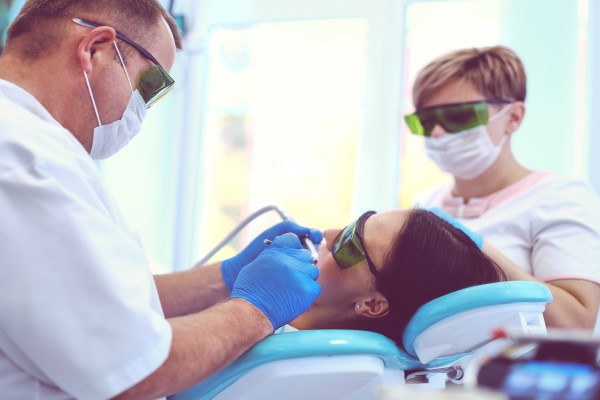Reasons a Dentist Would Recommend a Deep Cleaning

Your dentist might recommend a deep cleaning if you have been diagnosed with periodontal disease. Commonly known as gum disease, this condition affects about half of the people in the United States by the age of 45. Depending on how early the condition is detected, it can be reversed, but sometimes it may only be managed with routine deep dental cleanings. Also known as root scaling and planing, the procedure involves removing plaque and tartar from teeth surfaces and their roots. Let us take a look at the gum disease stages in which a deep cleaning can help you.
Figuring out if you need deep cleaning
A dentist might recommend deep cleaning teeth after performing a comprehensive periodic evaluation. This thorough examination of a patient’s gum tissues involves inserting a probe into the patient’s gum pockets. Healthy gum pockets should be no deeper than one to three millimeters. Any more than that might be a sign of gum disease. Now, let us review some of the reasons that a dentist might recommend deep cleaning or root scaling and planing.
1. To reverse gingivitis
The first stage of gum disease, a.k.a. gingivitis, can be reversed with improved oral hygiene and regular teeth cleaning or, in a more serious case, scaling and root planning (deep cleaning). Gingivitis is an inflammation of the gum tissue caused by bacteria that penetrate the gums and irritate them. Common signs and symptoms of gingivitis are:
- Bleeding gums
- Swollen gums
- Red, irritated gums
- Painful or sensitive gums
If the patient does not improve their oral care habits, the gingivitis will not only keep coming back but can progress into the advanced stage of gum disease, periodontitis. At this point, the disease cannot be reversed, only treated.
2. To prevent periodontitis
Periodontitis is inflammation of the tooth-supporting structures. It can be acute (rapid onset) or chronic (slow onset). Acute periodontitis often results from a bacterial infection; chronic periodontitis may be caused by poor oral hygiene, smoking, and certain medical conditions, such as diabetes.
There are many signs and symptoms of a periodontic infection, including:
- Persistent redness or bleeding in the gum tissue
- Persistent bad breath
- Loose teeth that cause problems while brushing or eating
It is too late to reverse gum disease at this stage, but it can be managed with routine root scaling and planing appointments. The procedure helps clean out bacteria in gum pockets that lead to the chronic inflammation of gum tissues associated with periodontitis. Performing deep cleaning on patients with periodontitis often helps them avoid more complicated treatments used to manage gum disease, like bone grafts, and it can prevent tooth loss.
The process
The regular teeth cleaning procedure involves removing tartar and plaque from teeth surfaces and below the gums. However, deep cleanings go further than that. During the treatment, the patient’s gum tissues are pulled back so the roots of their teeth can be carefully cleaned with specialized tools. The dentist will first scrape away any evidence of plaque, tartar, and bacteria from the enamel surface of the patient’s teeth with an ultrasonic toothbrush. The dentist will then continue the procedure by polishing the roots to smooth out any rough spots. This makes it more difficult for bacteria to accumulate in these areas. It also gives the patient’s gum tissues a smoother surface to attach to, which helps eliminate gum pockets. Medication might be applied to teeth roots to kill any bacteria there.
The procedure can take up to two hours to complete and is usually broken into multiple sessions. Patients are injected with a local anesthetic at the start of their treatment so they are numb and do not feel pain as the dentist works. The conventional way of performing deep cleanings involves using metal tools, but it can now be done with a laser. Often, patients prefer laser deep cleanings because they are less invasive than the traditional approach and lead to less discomfort, swelling, and bleeding.
Protect your teeth against gum disease
In addition to an improved at-home oral hygiene routine, proper care from the dentist can help you reverse the signs and symptoms of gingivitis and manage those of periodontitis. The deep cleaning will remove plaque and tartar buildup on your teeth and reduce the inflammation-causing bacteria in your gums. If you have any questions about periodontal disease or would like more information about our services, give us a call or visit our Sunnyvale clinic to set up an appointment with our dentist.
Request an appointment here: https://stonecanyondental.com or call Stone Canyon Dental at (972) 996-3191 for an appointment in our Sunnyvale office.
Check out what others are saying about our dental services on Yelp: Dental Cleaning and Examinations in Sunnyvale, TX.
Recent Posts
The lingering rule about dental cleaning is that it should be done twice every year. This is what dentists tell their patients to maintain good oral health. Because of busy schedules, you often get a phone call to remind you to come back for your next teeth cleaning. The reminder often leads many patients to…
Dental hygiene and fresh breath go hand in hand, and for many patients, a regular dental cleaning is a crucial part of their oral care routine to have healthy teeth and gums and avoid bad breath, or halitosis.In this article, we delve into dental cleaning and its relationship with bad breath. We explore how routine…
Your teeth and gums are some of the most important features of your smile, and it’s essential to take care of them with routine dental cleaning every six months or so. During these cleaning sessions, you’ll meet with your dentist and hygienist to go over any issues and talk about new ways to keep your…
A full dental exam is a common dental visit that involves an extensive review of the patient’s oral health to detect any issues (or the potential onset of issues) as early as possible. This helps prevent any problems by allowing the dentist to treat any concerns in the earliest stages possible, which can save the…







